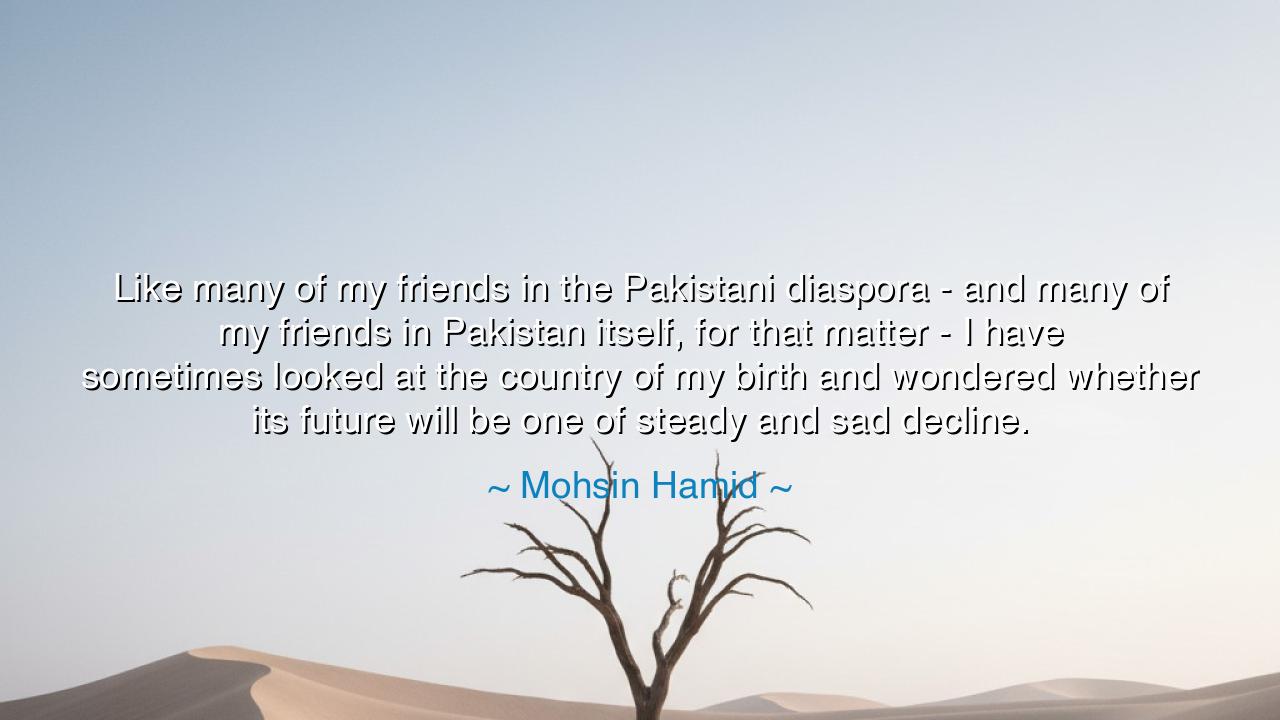
Like many of my friends in the Pakistani diaspora - and many of
Like many of my friends in the Pakistani diaspora - and many of my friends in Pakistan itself, for that matter - I have sometimes looked at the country of my birth and wondered whether its future will be one of steady and sad decline.






Hear the words of Mohsin Hamid, who speaks with both sorrow and love: “Like many of my friends in the Pakistani diaspora—and many of my friends in Pakistan itself, for that matter—I have sometimes looked at the country of my birth and wondered whether its future will be one of steady and sad decline.” In this reflection, we hear the voice of one torn between two worlds: the land of origin and the land of adoption. His words echo the eternal cry of exiles and wanderers who look back to their homeland with longing, yet with dread, wondering if the soil that gave them life will wither under the weight of history and human frailty.
The diaspora has always lived with this double vision—eyes fixed on the horizon of their new life, yet also glancing back, with hope or despair, to the homeland that remains stitched into their being. Hamid’s lament is not his alone, but the collective sigh of millions who live far from their birthplace and wonder whether the soil that nurtured them will endure or collapse. It is the grief of watching from afar as the house of your childhood grows weathered and cracked, unable to mend it, unable to leave it behind.
This grief is ancient. Recall the Jews exiled to Babylon, who sat by the rivers and wept, saying: “How shall we sing the Lord’s song in a strange land?” Their homeland lay in ruins, their temple destroyed, and yet their hearts clung to Jerusalem. Like Hamid, they wondered if their nation’s future was only one of decline, or if someday renewal might come. Their sorrow became scripture, their longing became a force of survival, proving that even in despair there is a seed of endurance.
Hamid speaks of sad decline, but within his words lies also a hidden strength: the honesty of naming what one fears. For the future of nations, like the fate of men, is not fixed; it is shaped by action, courage, and the willingness to confront decay. To voice despair is not to surrender—it is to recognize the peril, and in that recognition lies the first step to renewal. As doctors must first name the illness before they can heal it, so must a people admit their weaknesses before they can rise again.
We must learn from this: to love one’s homeland is not only to praise it, but to grieve for its failings. True loyalty is not blind adoration, but the courage to see clearly, to lament when the beloved falters, and to work tirelessly for its revival. The diaspora carries this responsibility doubly, for though far away, its sons and daughters remain bound to their birthplace by memory and identity. Their voices, resources, and visions may yet shape its destiny.
The lesson for all people is thus: when you look upon your community, your nation, or your family, do not turn away from the signs of decline. See them, name them, and ask how you may stand against them. If corruption spreads, choose integrity. If division rises, sow unity. If despair grows heavy, kindle hope. The fate of a land is not determined only by rulers and armies, but by the character and choices of its people, both those within its borders and those who live scattered beyond them.
Therefore, take action in your own life. Support the place you came from, not only with wealth, but with wisdom, truth, and compassion. Remain engaged, even from afar. Seek also to build where you now live, so that your identity becomes a bridge and not a wound. And above all, remember that nations may falter, but the spirit of a people can endure if its children carry forward the work of renewal.
So let Hamid’s lament be both a warning and a summons: decline is possible, but not inevitable. The future is not yet written. To the children of every homeland—whether near or far—falls the duty to speak honestly, to act courageously, and to dream of renewal even in the face of despair. For a nation’s heart beats not only in its soil, but in the souls of its people.






AAdministratorAdministrator
Welcome, honored guests. Please leave a comment, we will respond soon